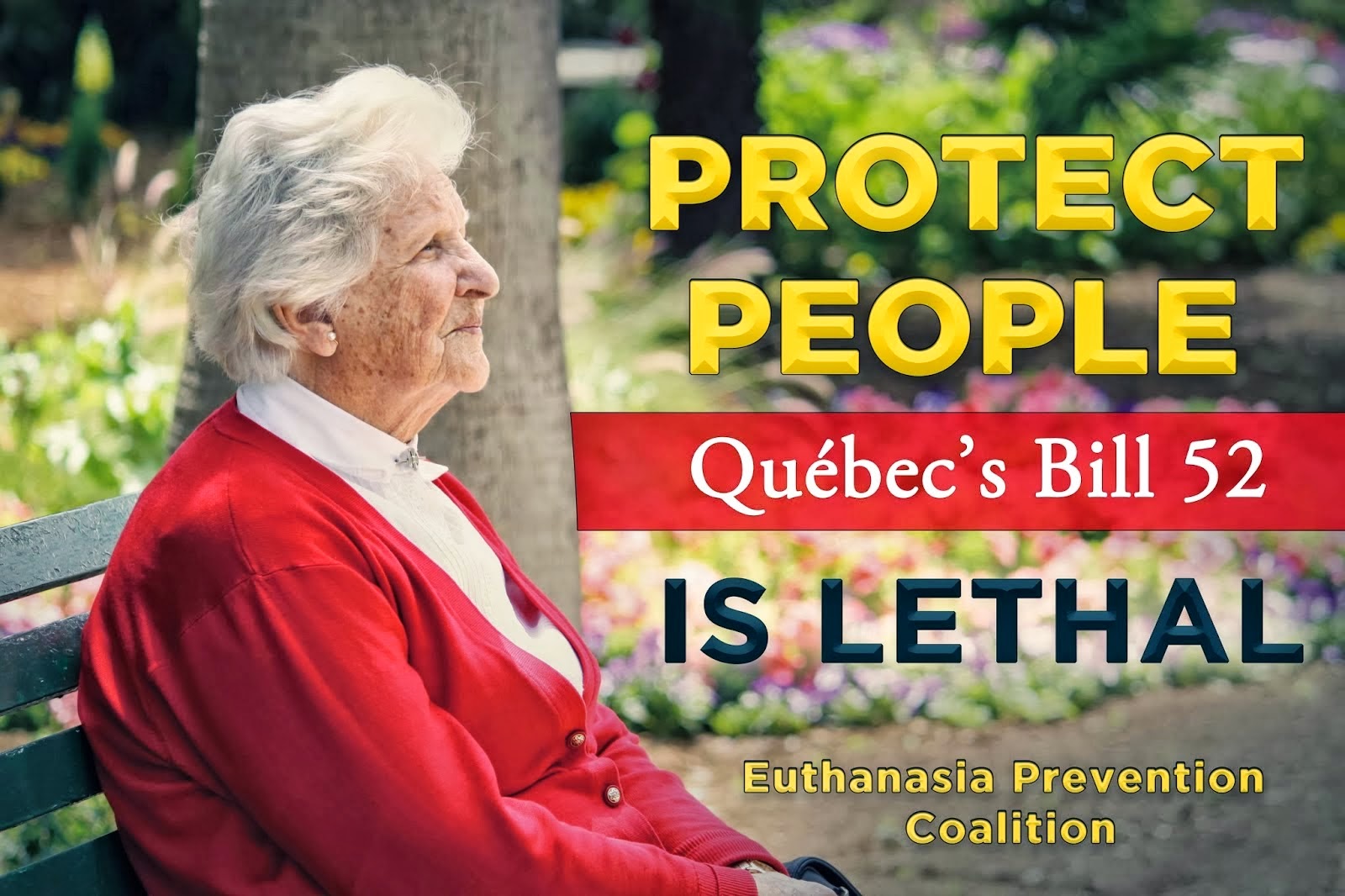On 21 April 2010 the Canadian House of Commons defeated Bill C-384 An Act to amend the Criminal Code (right to die with dignity) by 228-59.
The Quebec National Assembly passed an “An Act respecting end-of-life care” by a vote of 94-22. It came into effect on 10 December 2015. This Act permits euthanasia on the request of an adult who is “at the end of life; with a serious and incurable illness; and in an advanced state of irreversible decline in capability”.
On 6 February 2015 the Supreme Court of Canada in Carter v Canada (Attorney General) declared that provisions in the Canadian Criminal Code making it an offence to aid or abet suicide “unjustifiably infringe” section 7 [“Everyone has the right to life, liberty and security of the person and the right not to be deprived thereof except in accordance with the principles of fundamental justice.”] of the Charter of Rights and Freedoms “and are of no force or effect to the extent that they prohibit physician-assisted death for a competent adult person who (1) clearly consents to the termination of life and (2) has a grievous and irremediable medical condition (including an illness, disease or disability) that causes enduring suffering that is intolerable to the individual in the circumstances of his or her condition.” The declaration was suspended for a year, giving the opportunity for the Parliament to amend the offending laws by providing a scheme for physician assisted suicide.
The core paragraph in the judgement reads that: “The right to life is engaged where the law or state action imposes death or an increased risk of death on a person, either directly or indirectly. Here, the prohibition deprives some individuals of life, as it has the effect of forcing some individuals to take their own lives prematurely, for fear that they would be incapable of doing so when they reached the point where suffering was intolerable. The rights to liberty and security of the person, which deal with concerns about autonomy and quality of life, are also engaged. An individual’s response to a grievous and irremediable medical condition is a matter critical to their dignity and autonomy. The prohibition denies people in this situation the right to make decisions concerning their bodily integrity and medical care and thus trenches on their liberty. And by leaving them to endure intolerable suffering, it impinges on their security of the person.”
The argument based on the right to life is specious as it takes no account of the inevitability that a law permitting euthanasia will result in wrongful deaths based on medical errors, coercion, discrimination against or differential treatment of the disabled and mentally ill and suicide contagion.
The argument from liberty, if pressed to its logical conclusion, would require a law permitting assisted suicide or euthanasia on request by any person, including a minor, with capacity.
The argument from security is based on a false claim that pain and other physical symptoms cannot be relieved by best practice palliative care.
In response to the Supreme Court judgment, the Canadian parliament passed Bill C-14 which came into effect on 17 June 2016 and legalised euthanasia and assisted suicide on request for any adult who has “a serious and incurable illness, disease or disability”; is in “an advanced state of irreversible decline in capability”; and whose “natural death has become reasonably foreseeable, taking into account all of their medical circumstances, without a prognosis necessarily having been made as to the specific length of time that they have remaining”.
Increase in numbers
There have been three interim reports providing national data on euthanasia as well as reports on the data from Quebec, the most recent of which covers 1 July 2017 to 31 March 2018.
 |
| First report. |
Similarly the data for Quebec shows that official reports of euthanasia almost doubled from an average of 46 per month for the six month period 1 July 2016-31 December 2016 to an average of 90 per month for the three month period 1 January 2018-31 March 2018.
Reported acts of euthanasia in Quebec accounted for 1.18% of all deaths in 2017.
Unreported cases
There is a discrepancy of 171 cases of euthanasia between the number of official reports received (1493) and the number of cases reported by institutions (1664) in Quebec suggesting a failure by physicians to report in 10.3% of euthanasia cases.
Failure to comply with the legal processes
 |
| Quebec euthanasia |
Even after repeated requests for further information there is insufficient information to conclude whether or not the act of euthanasia complies with the law in 5% of cases.
In a further 5% of cases (62 cases out of 1374 for which a final assessment has been made) there was a failure to comply with the law, including:
- 29 cases in which the consulting physician was not independent from the physician who carried out euthanasia. However, this has been addressed by officially slackening the interpretation of the requirements for independence!
- 9 cases in which the physician who performed euthanasia did not ensure that the request for euthanasia was voluntary, informed and persistent
- 6 cases in which the consulting physician examined the person before a request for euthanasia was formally made
- 5 cases in which the approval was countersigned by an unqualified person
- 5 cases in which the person did not have a serious and incurable illness
- 4 cases in which the person did not have the required Quebec health insurance
- 2 cases in which the person was not at the end of life
- 2 cases in which the physician failed to verify that all the conditions for euthanasia were met.
Underlying conditions
Very limited data is provided on the underlying condition for which euthanasia is performed. In the last reporting period 9% of cases involved either an unreported condition or a condition other than cancer related, neurodegenerative or circulatory/respiratory system.
Some of the “other” conditions have included osteoarthritis, rheumatoid arthritis and “age-related frailty”.
The Canadian law only requires that “death be reasonably foreseeable”. The decision of the Ontario Superior Court of Justice in AB v Attorney General of Canada delivered on 19 June 2017, in paragraph 81, interpreted this requirement as not requiring any connection whatsoever between the underlying conditions for which euthanasia is sought and the reasonable foreseeability of death – which can be based simply on advanced age. The woman in this case was 79 years old.
Additionally there are the 5 cases from Quebec in which the person did not have a serious and incurable illness and the 2 cases from Quebec in which the person was not at the end of life.
Short time between initial request and euthanasia being performed
Section 29 (c) of the Quebec law requires that before performing euthanasia the physician must verify “the persistence of suffering and that the wish to obtain medical aid in dying remains unchanged, by talking with the patient at reasonably spaced intervals given the progress of the patient’s condition”.
Section 241.2 (3) (g) of the Canadian Criminal Code requires a physician to “ensure that there are at least 10 clear days between the day on which the request was signed by or on behalf of the person and the day on which the medical assistance in dying is provided or — if they and the other medical practitioner or nurse practitioner referred to in paragraph (e) are both of the opinion that the person’s death, or the loss of their capacity to provide informed consent, is imminent — any shorter period that the first medical practitioner or nurse practitioner considers appropriate in the circumstance”.
Nonetheless according to a recent study of euthanasia at three institutions in Quebec the median number of days between the request for euthanasia and the patient’s death was just 6 days.
This study also found that in 32% of cases a palliative care consultation only took place less than 7 days before euthanasia was requested and in a further 25% of cases it took place on the same day or AFTER euthanasia was requested. This suggests that euthanasia is being routinely provided to people before they have had a chance to experience the full effect of palliative care to relieve their suffering and concerns.
Reasons for requesting euthanasia
A study from an Ontario hospital reported that those who received euthanasia tended to be white and relatively affluent and 95% of them indicated that loss of autonomy was the primary reason for their request. Other common reasons included the wish to avoid burdening others or losing dignity and the intolerability of not being able to enjoy one’s life. Few patients cited inadequate control of pain or other symptoms.
Disability – the story of Candice Lewis
 |
| Candice Lewis with her mother. |
In September 2016 Candice went to the emergency room at Charles S. Curtis Memorial Hospital in St. Anthony after having seizures.
Dr. Aaron Heroux told her she was very sick and likely to die soon. He offered her assisted suicide. The doctor also proposed assisted suicide for Candice to her mother Sheila Elson.
This offer was repeated despite both Candice and her mother making it clear that this was not an option Candice would consider. Dr Heroux told Sheila she was being selfish by not encouraging her daughter to choose assisted suicide.
Candice describes how bad it made her feel that a doctor was offering her assisted suicide.
More than twelve months later Candice has recovered well and her health was much improved. Candice hasn’t been having any seizures, is now able to feed herself, walk with assistance, use her iPad. She is more alert, energetic and communicative. She was able to "walk" down the aisle as a bridesmaid at her sister’s wedding in August 2017. She is doing what she loves most, painting and being with her family.
Candice and her mother Sheila have been interviewed by Kevin Dunn, who produced a film on euthanasia and assisted suicide called Fatal Flaws. The film of the interview can be viewed here.
There are several take home lessons from Candice’s experience:
- Doctors can get the prognosis wrong. Candice was told she was dying but was flourishing twelve months later. A wrong prognosis can lead to assisted suicide or euthanasia. A life can be thrown away needlessly;
- People with a disability already suffer discrimination in health care. When assisted suicide and euthanasia are legal, people with a disability are more at risk of being offered death as a solution because doctors and others consider that they would be better off dead;
- Once doctors are authorised by the law to provide assisted suicide and euthanasia some of them will feel empowered to offer it to anyone they think would be better off dead. This undermines patients’ trust in doctors and can cause great distress.
 |
| Roger Foley |
Roger Foley, who has a crippling brain disease, has been seeking support to live at home. He is currently in an Ontario hospital that is threatening to start charging him $1,800 a day. The hospital has told Roger that his other option is euthanasia or assisted suicide under Canada’s medical assistance in dying law.







.jpg)


















